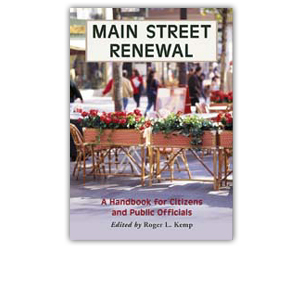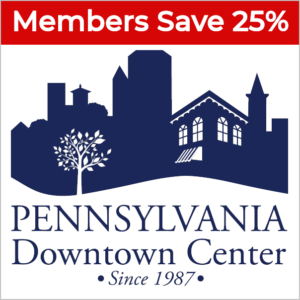Description
Main Street Renewal provides a thorough and complete discussion of the wide array of economic development tools available for downtown revitalization.
The book begins with a review of current economic development trends and practices based on a national study conducted by the International City/County Management Association. The survey results provide insights into how communities plan their economic development programs, the levels and sources of their funding, the types and number of people assigned to these programs, and how they determine program results.
The authors then turn their attention to the tools available for downtown revitalization and to actual case studies showing these tools in action.
The case studies detail how to use specialty retailing as the focus for redevelopment, how residential streets can be brought back to life, how to use plazas and public spaces to bring people downtown, lessons to be learned from suburban malls, how to use downtown’s available infill development potential, and more.
The communities examined are typically small ones, ranging in population from a few thousand in rural locations to over 50,000 in cities such as Santa Monica, CA, and West Palm Beach, FL. But the lessons they offer can be applied to communities of all sizes.
Table of Contents
-
- Introduction
- The state of small cities
- Overview of local economic development
- Trends and practices in local economic development
- Issues facing small businesses
- Organization and Management
- Local economic development practices
- How to get started
- Municipal government’s role
- Creating small business partnerships
- Conducting a community self-evaluation
- Managing development and growth
- The Tools
- Assessing development potential
- Community Reinvestment Act
- Downtown revitalization
- Downtown safety strategies
- Historic rehabilitation tax credit
- Keeping retailers on main street
- Parking facility management
- Rural banks and economic growth
- Small business development tools
- Strengthening downtown businesses
- Tax increment financing
- The Case Studies
- Creating “New” main streets in California, Florida, and Illinois
- The Santa Monica, California, Streetscape Project
- Bringing back neighborhood streets in Boulder, Colorado
- What West Palm Beach, Florida, learned from shopping malls
- Creative infill development strategies in Buckland, Georgia
- Developing an economic incentives ordinance in Cobb County, Georgia
- An assessment of economic development efforts in rural Illinois communities
- Public plazas bring new life to main streets in Indiana, Texas, and Wisconsin
- Establishing a main street through architecture in Columbus, Indiana
- Preserving Main Street in Madison, Indiana
- Dealing with a volume chain store in Carroll, Iowa
- Building community through strategic planning in McPherson County, Kansas
- Using specialty retail for economic survival in Ponchatoula, Louisiana
- Revitalizing the old mill town of Maynard, Massachusetts
- Evaluating Main Street in Corning, New York
- Rebuilding downtown in Grand Forks, North Dakota
- Suburbs working together in Cleveland Heights, Ohio
- Developing a downtown design assistance program in Pullman, Washington
- Conclusion
- Rethinking local economic development
- When to use incentives
- Ten myths about downtown revitalization
- Community agendas for the future: A corporate view
- Working together: Cities and suburbs
- Introduction
Appendix. Resource Organizations
Index
About the Editor
Roger L. Kemp, PhD, ICMA-CM, is Distinguished Adjunct Professor at the Edward S. Ageno School of Business of Golden Gate University and a career city manager for 25 years in California, New Jersey, and Connecticut.
His other books include, Cities and the Arts, and Small Town Economic Development.



